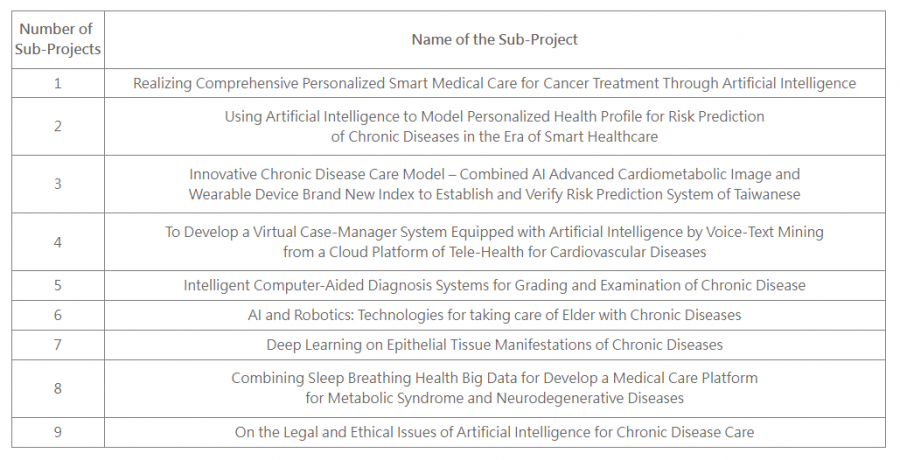Introduction
All Vista Healthcare Center
The mission of the All Vista Healthcare Center (MAHC) is to integrate our research projects and become an international research center utilizing cross disciplinary, cross-unit and international collaboration. We aim to lead domestic biomedicine teams to escalate the level of domestic biomedical technology, and benefit the health and wellbeing of the whole country; establishing an international research cluster of AI and biomedical practitioners, to promote Taiwan's major medical achievements to the world; and build ample biomedical databases, as well as basis for cross-domain collaborations to serve as bridge for international and industry-academia collaboration.
As chronic disease has always been an important medical and healthcare issue that receives worldwide attention, the center has started to execute the MOST project, “Flipping Medical and Healthcare for Chronic Disease Management with Artificial Intelligence and Big Health Data Analytics”, since 2022.
Among the ten leading causes of death, there are 70 to 80% of death were caused by chronic diseases, including cardiovascular diseases, cancer, diabetes, dementia and kidney diseases, which occupy huge medical expenses. Moreover, as the COVID-19 pandemic burst in 2020, medical care of chronic disease is now facing an even greater challenge. Thus, with the intensifying worldwide health crisis, the World Health Organization (WHO) has issued an appeal that all countries should prepare adaptive strategies on medical care of chronic disease in the post-pandemic era.
This project aims to apply Artificial Intelligence (AI) and big health data analytics on building integrated medical and healthcare platform for chronic disease. Within this project, there are 10 top-notch research teams which will be focusing on common chronic diseases in Taiwan (including: cardiovascular diseases, cancer, metabolic diseases, respiratory diseases, and neurodegenerative diseases), and developing the following 3 platforms:
(1) prevention and prediction of chronic disease
(2) detection, diagnosis and prognosis of chronic disease
(3) medical care of chronic disease.
With the platforms, heterogeneous data including electronic medical record, medical image, physiological‑signal, biochemistry, data of wearable device, environmental data, medical verbal content, bioinformatics, and governmental data like Taiwan’s national health insurance data and nationwide cancer registry, will be analyzed with technologies including AI, IoMT, cloud computing, robotics and federated learning, and being applied in medical care institutions, communities, or home environments. And we also expect to collaborate with medical care and insurance industries to expand the application field. In addition, strategies on data governance, ethics and rules of law are also carefully considered as this project is related to highly-sensitive medical health data, application of AI technology, and field application (with possible development on software as a medical device).
List of Sub-Projects:
As chronic disease has always been an important medical and healthcare issue that receives worldwide attention, the center has started to execute the MOST project, “Flipping Medical and Healthcare for Chronic Disease Management with Artificial Intelligence and Big Health Data Analytics”, since 2022.
Among the ten leading causes of death, there are 70 to 80% of death were caused by chronic diseases, including cardiovascular diseases, cancer, diabetes, dementia and kidney diseases, which occupy huge medical expenses. Moreover, as the COVID-19 pandemic burst in 2020, medical care of chronic disease is now facing an even greater challenge. Thus, with the intensifying worldwide health crisis, the World Health Organization (WHO) has issued an appeal that all countries should prepare adaptive strategies on medical care of chronic disease in the post-pandemic era.
This project aims to apply Artificial Intelligence (AI) and big health data analytics on building integrated medical and healthcare platform for chronic disease. Within this project, there are 10 top-notch research teams which will be focusing on common chronic diseases in Taiwan (including: cardiovascular diseases, cancer, metabolic diseases, respiratory diseases, and neurodegenerative diseases), and developing the following 3 platforms:
(1) prevention and prediction of chronic disease
(2) detection, diagnosis and prognosis of chronic disease
(3) medical care of chronic disease.
With the platforms, heterogeneous data including electronic medical record, medical image, physiological‑signal, biochemistry, data of wearable device, environmental data, medical verbal content, bioinformatics, and governmental data like Taiwan’s national health insurance data and nationwide cancer registry, will be analyzed with technologies including AI, IoMT, cloud computing, robotics and federated learning, and being applied in medical care institutions, communities, or home environments. And we also expect to collaborate with medical care and insurance industries to expand the application field. In addition, strategies on data governance, ethics and rules of law are also carefully considered as this project is related to highly-sensitive medical health data, application of AI technology, and field application (with possible development on software as a medical device).
List of Sub-Projects:

